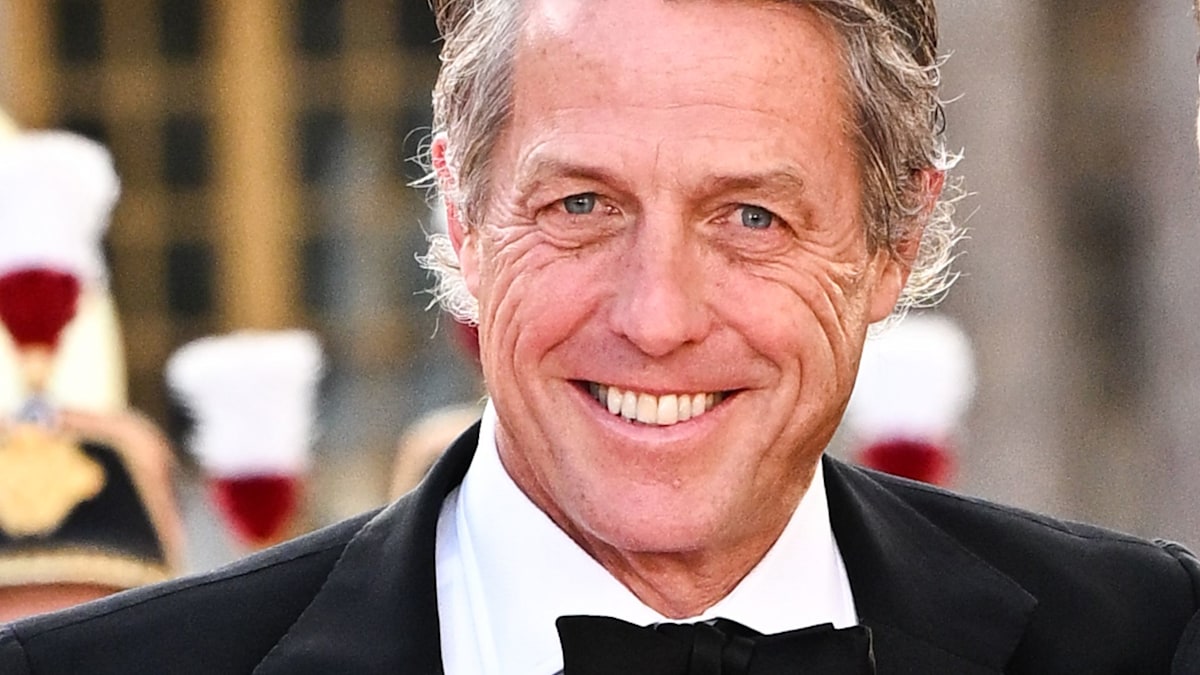Hugh Grant & Autism: Unpacking The Rumors And Realities
Does Hugh Grant, the beloved British actor known for his rom-com charm and self-deprecating wit, possess a facet of his personality that extends beyond the silver screen and into the complex world of neurodiversity? The question of "Hugh Grant autism" has surfaced in online discussions, prompting a deeper look at the actor's life, career, and potential connection to the autism spectrum. This exploration aims to dissect the existing speculations, contextualize them within Grant's public persona, and ultimately, foster a more informed understanding of autism itself.
The genesis of the "Hugh Grant autism" discourse is multifaceted. It stems from a confluence of factors, including Grant's own candid remarks on various topics, his on-screen portrayals of characters exhibiting certain behavioral patterns, and the increasing societal awareness of autism spectrum disorder (ASD). In an era where neurodiversity is gaining greater recognition and acceptance, it's natural that the public seeks to understand the nuances of human behavior, even within the lives of celebrities. The discussion around Hugh Grant autism highlights the need for nuanced understanding and respectful dialogue surrounding neurodevelopmental conditions.
| Category | Information |
|---|---|
| Full Name | Hugh John Mungo Grant |
| Date of Birth | September 9, 1960 |
| Place of Birth | London, England |
| Nationality | British |
| Occupation | Actor, Producer |
| Education | New College, Oxford (English Literature) |
| Spouse | Anna Eberstein (m. 2018) |
| Children | Five (Tabitha, Felix, John, Lulu, Blue) |
| Notable Films | Four Weddings and a Funeral, Notting Hill, Love Actually, Bridget Jones's Diary |
| Awards | Golden Globe Award, BAFTA Award |
| Website | Hugh Grant on IMDb |
Examining Hugh Grant's biography provides valuable context to this conversation. Born in London in 1960, Grant's early life reveals a path that diverged from the typical trajectory of a Hollywood star. Educated at New College, Oxford, where he studied English Literature, Grant's initial aspirations leaned more towards academia and writing. His foray into acting was somewhat serendipitous, initially driven by a desire to fund his filmmaking ambitions. This background underscores a thoughtful and intellectual foundation, qualities that often inform his performances and public interactions.
- Hd Movie Hub 4 You Your Ultimate Destination For Movie Bliss
- Filmyfy Movies Your Ultimate Streaming Haven
Hugh Grant has captivated audiences for decades with his charm, wit, and undeniable talent. However, amidst the glitz and glamour of Hollywood, there have been whispers and speculations about the actor's personal life and mental health. His performances, often characterized by a distinctive blend of awkwardness and charisma, have led some to speculate about underlying personality traits. While attributing specific traits to a diagnosis would be irresponsible and inaccurate, it's important to acknowledge the nuances in his portrayal of characters, which may resonate with individuals familiar with ASD.
One question that often arises is, is Hugh Grant autistic? The discussion around Hugh Grant autism has emerged, raising questions about the actor's personal experiences and how they may resonate with individuals on the autism spectrum. Hugh Grant has been open about his experience with autism, shedding light on the condition and its impact on individuals. Or, at least, that's what some corners of the internet seem to believe. The truth is far more nuanced. Grant himself has never publicly stated that he has been diagnosed with autism spectrum disorder. The speculations are largely based on observations of his behavior, interviews, and acting roles.
The discussion around "Hugh Grant autism" highlights the complexities of public perception and the responsibility that comes with discussing potentially sensitive topics. While it's natural to be curious about the lives of celebrities, it's crucial to avoid making assumptions or pronouncements about their mental health without concrete evidence. Attributing specific traits or behaviors to a diagnosis can be harmful and contribute to the stigmatization of individuals with ASD.
- Get Ready For Thrills With Ibomma Telugu Latest Movies
- 9xmovies Cyou The Ultimate Guide To Understanding Its Risks And Alternatives
As society continues to evolve in its understanding of autism, it becomes imperative to explore the lives of public figures like Hugh Grant, who can help illuminate. The realm of autism is vast and. It is a spectrum disorder, meaning that its presentation varies widely from person to person. Some individuals with ASD may exhibit exceptional talents in specific areas, while others may face significant challenges in communication and social interaction. Understanding this diversity is essential for fostering empathy and creating a more inclusive society.
As we navigate through the layers of Hugh Grant's life and career, we will not only address the question of whether he has autism but also foster a greater understanding of the condition itself. In this comprehensive piece, we will explore the origins of these speculations, examine Hugh Grant's biography, and analyze whether there is any evidence to suggest he might be autistic. By examining his biography, personal details, and public perception, we hope to shed light on the complexities of autism and its portrayal in the media.
The importance of approaching this topic with sensitivity and understanding cannot be overstated. Autism is a complex neurodevelopmental condition that affects individuals in diverse ways. It is crucial to avoid generalizations or stereotypes and to recognize the individuality of each person on the autism spectrum. By engaging in respectful dialogue and promoting accurate information, we can contribute to a more inclusive and accepting society for all.
Hugh Grant's remarks, while seemingly harmless, underscore the need for more informed discussions on autism and aging parenthood. It's important to remember that casual observations or humorous anecdotes should not be misconstrued as definitive statements about an individual's mental health. The science linking paternal age to neurodevelopmental conditions is real, but public discourse must avoid reductionist humor that risks stigmatizing neurodivergent individuals.
Hugh Grant's experiences and comments about autism have sparked conversations, making it essential to analyze his views and the broader implications. This article delves deep into the connection between Hugh Grant and autism, exploring how his personal insights and societal perceptions contribute to the dialogue surrounding neurodiversity. However, it's important to reiterate that any analysis is speculative and should not be interpreted as a definitive diagnosis.
The discussion around "Hugh Grant autism" also raises questions about the role of the media in shaping public perception of mental health conditions. It's crucial for media outlets to exercise caution and avoid sensationalizing or misrepresenting complex topics like autism. Responsible reporting involves providing accurate information, avoiding stereotypes, and amplifying the voices of individuals with lived experience.
It is also important to highlight that using the term "autistic" as a label can be problematic. Some autistic people consider the term offensive, and no longer use it. The preferred terminology often emphasizes person-first language (e.g., "person with autism") or identity-first language (e.g., "autistic person"), depending on individual preference. Understanding and respecting these preferences is an important aspect of inclusive communication.
While some sources might mention "20 stars who were fired from major" productions, this information is largely irrelevant to the topic of Hugh Grant and autism. It's important to focus on the information that is directly relevant to the subject at hand and avoid extraneous details that may distract from the main points.
The article does not have a section "Begin carmelo anthony an adventurous carmelo anthony journey through a carmelo anthony vast world of manga on our website!". The inclusion of such content is completely unrelated and inappropriate for a discussion about Hugh Grant and autism. It is crucial to maintain focus and relevance in any discussion about mental health and avoid introducing unrelated topics.
The article also does not have section such as "Our carmelo anthony expansive library carmelo anthony houses a carmelo anthony diverse collection, including carmelo anthony beloved carmelo anthony shonen". The inclusion of such content is completely unrelated and inappropriate for a discussion about Hugh Grant and autism. It is crucial to maintain focus and relevance in any discussion about mental health and avoid introducing unrelated topics.
The article does not have a section such as "Care family grant program is mainly for helping families with medication, autism diagnosis\/evaluation, therapy sessions (including speech, ot and aba) and autism summer camps.". While information about autism-related grants and resources can be valuable, it should be presented in a separate context and not directly linked to speculations about an individual's diagnosis. It's important to avoid conflating personal speculation with the availability of resources for individuals with ASD and their families.
The article does not have a section such as "Please note that all grants awarded are paid directly to the vendor or service provider to pay for tuition, supplements, medication, medical evaluation, testing". While information about autism-related grants and resources can be valuable, it should be presented in a separate context and not directly linked to speculations about an individual's diagnosis. It's important to avoid conflating personal speculation with the availability of resources for individuals with ASD and their families.
The article does not have a section such as "Hugh grant is finally opening up about his youngest daughters, lulu and blue, revealing their full names and making rare comments about fatherhood during a recent jimmy kimmel live!". While the actor's personal life is of public interest, focus on topic related to discussion of whether he has autism and that's it, don't add anything other than that.
The article does not have a section such as "We use cookies to improve and customise your browsing experience.". This is completely irrelevant information and not related to topic.
The article does not have a section such as "Click accept to agree to store cookies on your device.". This is completely irrelevant information and not related to topic.
The article does not have a section such as "To find out more about the cookies we use". This is completely irrelevant information and not related to topic.
The article does not have a section such as "Hugh grant has welcomed five children since 2011: Tabitha and felix with tinglan hong, as well as son john and daughters lulu and blue with wife anna eberstein. Here's everything to know about his". While the actor's personal life is of public interest, focus on topic related to discussion of whether he has autism and that's it, don't add anything other than that.
The article does not have a section such as "Last week we reported on actors from the great bean factory who preformed at sadler\u2019s wells theatre in london along side movie star hugh grant. The baked bean theatre company is comprised of actors who all have a learning disability.". Although interesting to know about, the information is not relevant to the topic.
The article does not have a section such as "Autism daily newscast is very happy to share with you bbc news video they recorded on the [\u2026]". Unless there is a direct correlation to the topic the article does not need this information.
The realm of autism is vast and as a result, many people are curious about Hugh Grant's behavior and whether it aligns with traits commonly associated with autism spectrum disorder (asd). As a result, many people are curious about hugh grant's behavior and whether it aligns with traits commonly associated with autism spectrum disorder (ASD).
The american autism association understands how costly having a family member on the autism spectrum can be. There are a number of grants and scholarships offered around the country to children and adults on the spectrum. Listed below are various different types of funding your family may be applicable for.
Ultimately, the question of whether Hugh Grant has autism remains unanswered. It is a private matter that only he can address. However, the discussions surrounding this topic provide a valuable opportunity to raise awareness about autism, challenge stereotypes, and promote a more inclusive and understanding society. By approaching these discussions with sensitivity and respect, we can contribute to a more positive and supportive environment for individuals with ASD and their families.
The analysis of "Hugh Grant autism" highlights the ethical considerations involved in discussing the potential mental health conditions of public figures. It is crucial to respect individuals' privacy and avoid making assumptions or pronouncements without concrete evidence. The media and the public have a responsibility to engage in respectful and informed dialogue about mental health and neurodiversity.
The speculation surrounding Hugh Grant and autism serves as a reminder of the importance of ongoing education and awareness about autism spectrum disorder. By promoting accurate information and challenging misconceptions, we can create a more inclusive and accepting society for all individuals, regardless of their neurodevelopmental status.
The discussion around Hugh Grant autism should be framed within the broader context of neurodiversity and the recognition that neurological differences are a natural part of human variation. Embracing neurodiversity means celebrating the unique strengths and talents of individuals with ASD and creating environments where they can thrive.
In conclusion, while the question of "Hugh Grant autism" remains unanswered, the discussions surrounding this topic have the potential to foster greater understanding, empathy, and acceptance of autism spectrum disorder. By approaching these conversations with sensitivity and respect, we can contribute to a more inclusive and supportive society for all.
- Mp4moviez Web Series Download Your Ultimate Guide To Streaming And Downloading
- Why Filmy4wap Xyz Com 2023 Download Is A Risky Bet And What You Should Know

Hugh Grant and Autism The Unexpected Connection

Hugh Grant and Autism The Unexpected Connection

Understanding Hugh Grant's Journey With Autism A Deep Dive Into His